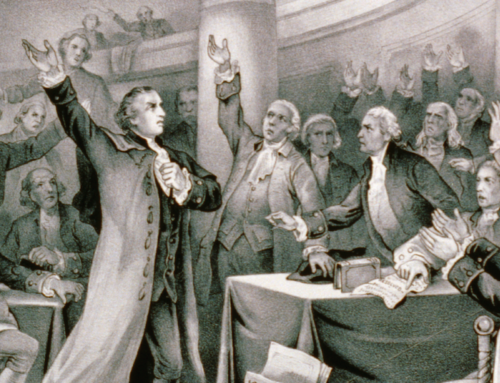 Liberals have a new slogan (new to me, at least). They say, “Protect Our Progress!”
Liberals have a new slogan (new to me, at least). They say, “Protect Our Progress!”
According to the Organizing for America website, they recently held a phone bank in North Carolina. The informational page read:
We’ve made significant progress together in the last two years. There are those who want to stop our country moving forward to undo the progress we’ve achieved, but our community is looking toward the future. We’ll be meeting at the Charlotte OFA Office to protect our progress—defending healthcare reform. Your voice is needed, so come out and join us at 6 p.m. to call Republican representatives and remind them that we are holding them accountable.
I have to admit- I like this little blurb! I like holding government officials accountable. I admire their tenacity in defending healthcare reform, which is more like healthcare overhaul and a love letter to special interests groups. My teeny-weeny remark I do have to make is this: the two year mark. I know that is the length of President Obama’s presidency to date, but President Obama’s passed legislation is not a proper measure of progress.
I know, I know—call me sentimental! But two years is not a substantial amount of time compared to the United States turning 235 this year and the US Constitution turning a hearty 224 on September 17 (less than 8 months to go!). Even compared to the length of the Progressive era of the 20th century, it’s only been a mere 99 years since Woodrow Wilson was elected President, and just look at this mess! Tsk, tsk.
Winston Elliott brought up the interesting argument earlier in his post, “When is a change in Government a Duty?” —”Is the current political climate a failure of Constitutional government?” he asked. And later in the comments, he quoted M.E. Bradford, who said, “”Reaction is a necessary term in the intellectual context we inhabit in the late twentieth century because merely to conserve is sometimes to perpetuate what is outrageous.”
Call me old-fashioned (although I prefer the term “traditional”!), but I am a firm believer in the institution. It is the time-tested and proven fact that man can exist and flourish within boundaries, and not be hindered. In fact, by having lines drawn, it allows for more creativity and innovation. No one can say Michelangelo lacked creativity, or that Caravaggio could have done better. They both had style, after mastering the basics.
Anyone can write, but a true wordsmith can transform a mind through words everyone uses, but arranges differently. Listening to orchestras perform is a marvel—each section playing their part perfectly and separately, but all instruments blending, moving in unison and staying on tempo. The cello isn’t going to rush through its part, or the flute try to outplay the clarinet. That would ruin the sound of the symphony.
“In other words,” said Winston, “would the modern “revolution” be to reestablish our government with the intent to truly follow the Constitution? In these times to return to our Republic’s first principles would be truly revolutionary (or reactionary in Bradford’s term).”
Here, here! But what say Ezra Klein?
Klein, a liberal political blogger and columnist, admitted to Norah O’Donnell on MSNBC that, “The issue of the Constitution is that the text is confusing because it was written more than 100 years ago and what people believe it says differs from person to person and differs depending on what they want to get done.”
His intent was to mock Republicans for wanting to read the Constitution before the 112th Congress commenced; his folly was revealed first in ignorance of how old the Constitution is (try over 200 years) and secondly, in a denial of our country’s brilliant foundation. It is the Constitution’s very broadness which allows individuals to find purpose and direction within it.
The problem is not with progress either- progress has been made in this country, and made by the Constitution itself. Dinesh D’Souza, for example, argued in The End of Racism that the fact that America had slaves wasn’t the astonishing part- most civilizations did. The amazing part was how fast we as a country recognized it as an evil and got rid of it, thanks to enormous efforts put out by black and white people.
When the 112th Congress read the Constitution aloud, the slave clause was continually brought up as a reason why the Constitution is bunk. But in January 1865, Congress passed the 13th Amendment, which abolished slavery. (Ratified by the states 11 months later!) How is referring to a law overturned almost 150 years ago progress? Talk about living the past! I don’t see anyone bringing up Prohibition again… and how was that problem solved? Through a Constitutional amendment, of course!
In other words, the Progressives think they can do better and be more effective if they bulldoze legislation through Congress. But have they ever considered, just for sport, actually working with the system of government they have now? They might be pleasantly surprised! It’s a pretty decent one, especially considering the alternatives.
Klein also told O’Donnell, “the new rules [that] require every bill [to] name its constitutional authority in the bill’s text and what I want to point out about that is that bills don’t normally do that now.” (Emphasis mine.)
And his point is…? So what if they don’t normally do that? Now they do. See? Progress! It is also important to remember that the Constitution was not written for one party, but for all American citizens. “We are all Republicans, we are all Federalists,” said the insatiably quotable Thomas Jefferson in his 1801 Inagural Address, where he also said,
During the contest of opinion through which we have passed the animation of discussions and of exertions has sometimes worn an aspect which might impose on strangers unused to think freely and to speak and to write what they think; but this being now decided by the voice of the nation, announced according to the rules of the Constitution, all will, of course, arrange themselves under the will of the law, and unite in common efforts for the common good. All, too, will bear in mind this sacred principle, that though the will of the majority is in all cases to prevail, that will to be rightful must be reasonable; that the minority possess their equal rights, which equal law must protect, and to violate would be oppression. (Emphasis mine.)
It is because of the Constitution (that bit o’ paper, the relic of Founders dead and gone) that our Res Publica side can flare up and react with the dust of stale, liberal ideas, which seek the end results of a free society without its means. The spontaneous combustion of ideas can only flourish given the right atmosphere. Let us go then, you and I, and conserve our great nation by upholding its documents and laws, so that future generations can live long and prosper without tyranny over body or mind. We didn’t inherit this freedom without a fight, either, so prepare yourselves accordingly, gentle readers.
Protect our progress indeed, and our Constitution too!
Books on the topic of this essay may be found in The Imaginative Conservative Bookstore. The Imaginative Conservative applies the principle of appreciation to the discussion of culture and politics—we approach dialogue with magnanimity rather than with mere civility. Will you help us remain a refreshing oasis in the increasingly contentious arena of modern discourse? Please consider donating now.







Many thanks for this! Somewhere Chesterton has a fine essay linking limits to creativity; saying that one may find it hard to write a poem on short notice, but less so with the imposed limits of writing a funny poem about a man with big feet. He also supports Julie's argument somewhere else by noting succinctly, 'new roads, new ruts.' As she says, institutions and standards and traditions are often guidelines to producing quality. Long years ago I read painter and critic Wm Rothenstein's 2 vol. memoirs where he recalled meeting an old JM Whistler, no longer the enfant terrible and rebel. Whistler regretted savaging his predecessors, like the realist Ingres whom he said knew more about the techniques of painting than any of his own modernist contemporaries who ignored the old rules (e.g., fat on lean) in favour of 'self expression.' As a result, Whistler complained, his modernist works and those of his contemporaries had already crackled badly while works by Ingres to Caravaggio looked as good as new. Now there's a metaphor for us all!
On Progress, alas, I tend to side with Ogden Nash, probably because I am prematurely old and grumpy. "Progress," says Nash, "may have been all right once, but it has gone on too long."
Stephen Masty